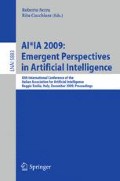Abstract
Argument classification is the task of assigning semantic roles to syntactic structures in natural language sentences. Supervised learning techniques for frame semantics have been recently shown to benefit from rich sets of syntactic features. However argument classification is also highly dependent on the semantics of the involved lexicals. Empirical studies have shown that domain dependence of lexical information causes large performance drops in outside domain tests. In this paper a distributional approach is proposed to improve the robustness of the learning model against out-of-domain lexical phenomena.
Access this chapter
Tax calculation will be finalised at checkout
Purchases are for personal use only
Preview
Unable to display preview. Download preview PDF.
References
Fillmore, C.J.: Frames and the semantics of understanding. Quaderni di Semantica 4(2), 222–254 (1985)
Gildea, D., Jurafsky, D.: Automatic labeling of semantic roles. Computational Linguistics 28, 245–288 (2002)
Shen, D., Lapata, M.: Using semantic roles to improve question answering. In: Proc. of EMNLP-CoNLL, Prague, pp. 12–21 (2007)
Punyakanok, V., Roth, D., Yih, W.: The necessity of syntactic parsing for s.antic role labeling. In: Proceedings of IJCAI 2005 (2005)
Johansson, R., Nugues, P.: Semantic structure extraction using nonprojective dependency trees. In: Proc. of SemEval 2007, Prague, June 23-24 (2007)
Moschitti, A., Pighin, D., Basili, R.: Tree kernels for semantic role labeling. Computational Linguistics 34(2), 193–224 (2008)
Johansson, R., Nugues, P.: The effect of syntactic representation on semantic role labeling. In: Proceedings of COLING, Manchester, UK, August 18-22 (2008)
Sahlgren, M.: The Word-Space Model. PhD thesis, Stockholm University (2006)
Padó, S., Lapata, M.: Dependency-based construction of semantic space models. Computational Linguistics 33(2), 161–199 (2007)
Dowty, D.: Thematic proto-roles and argument selection. Language 6(3) (1991)
Pradhan, S.S., Ward, W., Martin, J.H.: Towards robust semantic role labeling. Computational Linguistics 34(2), 289–310 (2008)
Baker, C.F., Ellsworth, M., Erk, K.: Semeval-2007 task 19: Frame s.antic structure extraction. In: Proc. of SemEval, Prague, pp. 99–104 (2007)
Fürstenau, H., Lapata, M.: Semi-supervised semantic role labeling. In: Proceedings of the 12th Conference of the European Chapter of the ACL (EACL 2009), Athens, Greece. Association for Computational Linguistics, March 2009, pp. 220–228 (2009)
Erk, K.: A simple, similarity-based model for selectional preferences. In: Proc. of the 45th Annual Meeting of the Association of Computational Linguistics, Prague. Association for Computational Linguistics, June 2007, pp. 216–223 (2007)
Pennacchiotti, M., De Cao, D., Basili, R., Croce, D., Roth, M.: Automatic induction of framenet lexical units. In: Proc. of EMNLP 2008 Hawaii (2008)
Schütze, H.: Automatic word sense discrimination. Computational Linguistics 24(1), 97–124 (1998)
Harris, Z.: Distributional structure. In: Katz, J.J., Fodor, J.A. (eds.) The Philosophy of Linguistics. Oxford University Press, New York (1964)
Pado, S.: Cross-Lingual Annotation Projection Models for Role-Semantic Information. PhD thesis, Saarland University (2007)
Landauer, T., Dumais, S.: A solution to plato’s probl.: The latent semantic analysis theory of acquisition, induction and representation of knowledge. Psychological Review 104, 211–240 (1997)
Heyer, L.J., Kruglyak, S., Yooseph, S.: Exploring expression data: Identification and analysis of coexpressed genes. Genome Research (9), 1106–1115 (1999)
Basili, R., De Cao, D., Marocco, P., Pennacchiotti, M.: Learning selectional preferences for entailment or paraphrasing rules. In: Proc. of RANLP 2007 (2007)
Kuhn, H.W.: The hungarian method for the assignment probl. Naval Research Logistics Quarterly 2, 83–97 (1955)
Finkel, J.R., Grenager, T., Manning, C.D.: Incorporating non-local information into information extraction systems by gibbs sampling. In: ACL. The Association for Computer Linguistics (2005)
Pado, S., Lapata, M.: Dependency-based construction of semantic space models. Computational Linguistics 33 (2007)
Author information
Authors and Affiliations
Editor information
Editors and Affiliations
Rights and permissions
Copyright information
© 2009 Springer-Verlag Berlin Heidelberg
About this paper
Cite this paper
Giannone, C., Croce, D., Basili, R., De Cao, D. (2009). A Robust Geometric Model for Argument Classification. In: Serra, R., Cucchiara, R. (eds) AI*IA 2009: Emergent Perspectives in Artificial Intelligence. AI*IA 2009. Lecture Notes in Computer Science(), vol 5883. Springer, Berlin, Heidelberg. https://doi.org/10.1007/978-3-642-10291-2_29
Download citation
DOI: https://doi.org/10.1007/978-3-642-10291-2_29
Publisher Name: Springer, Berlin, Heidelberg
Print ISBN: 978-3-642-10290-5
Online ISBN: 978-3-642-10291-2
eBook Packages: Computer ScienceComputer Science (R0)

